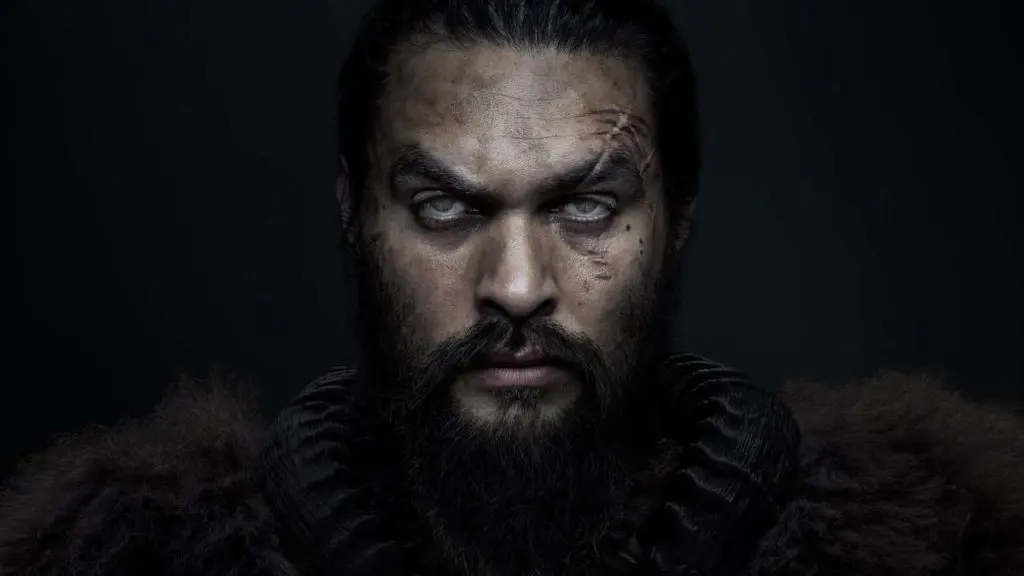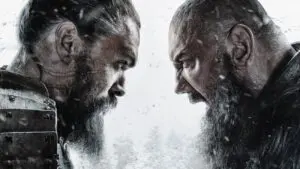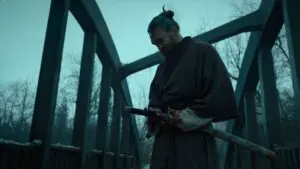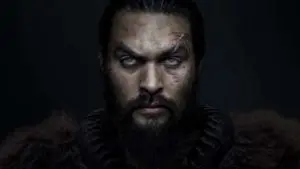Summary
“House of Enlightenment” was a strong finale to close out the first season of See, and some logical leaps notwithstanding, it sets the stage well for the story to be continued.
This recap of See Season 1, Episode 8, “House of Enlightenment”, contains spoilers. You can check out our thoughts on the previous episode by clicking these words.
It seems perfectly fitting that the titular “House of Enlightenment” in See Episode 8, the show’s first season finale, is a penitentiary. In it, Jerlamarel (Joshua Henry), his many children and sightless acolytes, are prisoners, literally and figuratively. They’re trapped by the false security of their walls and their gift of vision, of knowledge, accumulated second-hand through musty tomes that unlock the secret of an old world they believe they can restore. The underlying question of See is not whether they can, but whether they should; whether sight is a gift as they claim, or a curse, a distraction from nature and connection.
It doesn’t take long for Haniwa (Nesta Cooper) and Kofun (Archie Madekwe) to feel the absence of both those things once they’re rehomed in the lamplit House of Enlightenment, greeted by people in tucked shirts and trousers, shown how to eat with spoons, and housed in separate cells, though they’re never referred to as such. If these people are a family, they wonder, why don’t they all sleep together? Kofun and Haniwa do, discussing how they miss Baba Voss (Jason Momoa), their dad if not their father.
Family is a complicated thing, as proved here, and elsewhere in See Episode 8, as Tamacti Jun (Christian Camargo) explains to Maghra (Hera Hilmar) how they might both be turned on if they cannot convince Queen Kane (Sylvia Hoeks) to abdicate the throne. She, of course, will not, despite being told by Maghra that she essentially has no choice.
But what I like about this show is how easy it is to make a choice that is profoundly important, such as the one Queen Kane makes in turning on Tamacti Jun with the help of Boots (Franz Drameh), and how clumsy the result is. It isn’t a grandiose, climactic battle, just a scuffle, and confusion, and Maghra’s gradual understanding that a knife has been lodged in the chest of her ally and protector. Without him, and without his loyal legions, Maghra can’t usurp Queen Kane. Their only option is to pretend that Tamacti Jun volunteered himself for a soldier’s death as penance for his failures and to agree to rule together. It isn’t an ideal outcome for anyone except Queen Kane, who, on the subject on building a sighted kingdom, asks Maghra to tell her more about her son, as they ride away from the village they’ve set ablaze.
Maghra’s son, on that subject, sees straight through Jerlamarel’s divine explanations for his sanctuary, which remains as much as a prison as it always was. Guns line the walls – Chekhov would be pleased, as we’ll see – and incriminating whispers float through the corridors, as Jerlamarel discusses selling off Haniwa to a militarized tribe who believe her to be the true child of Baba Voss – their leader, it’s later revealed, is Baba’s brother.
That revelation comes from Jerlamarel himself, but before it, Kofun, refusing to play along, is taken outside to be executed. But Paris (Alfre Woodard), having earlier sensed his danger, evidently led Baba Voss back to the House of Enlightenment, and he saves Kofun. He and his son stalk the prison, killing the guards until Baba confronts Jerlamarel himself. It isn’t a fair fight since Jerlamarel can see and is armed with a gun, but as Baba Voss repeatedly insists, he’s a coward. Even with those advantages, he can’t win, especially once Kofun cuts the lights and the scene is plunged into darkness, suddenly evoking Batman’s tussle with Bane in The Dark Knight Rises: “The shadows betray you because they belong to me,” and all that. Props to whoever came up with the idea of the gun’s muzzle flashes lighting up Baba Voss right behind a panicked Jerlamarel; a great shot. Baba Voss, fittingly, blinds Jerlamarel with his thumbs.
As See Episode 8 – and with it, the show’s first season – draws to a close, Baba Voss, Kofun and Paris are reunited, and set out to rescue Haniwa. The stage is set for a second season, leaving just enough unanswered questions and dangling plot threads for the wait to be an eager one. Some questions of worldbuilding logic notwithstanding – did Baba Voss, for instance, only know what a gun was so he could crack that no balls joke? – See managed to find its way in the end; perhaps not always gracefully, but determinedly, and it created a show that I came to enjoy much more than I ever thought I would. See has an ardent fanbase who I can’t imagine will be too disappointed with this ending, and I suspect they’ll eagerly tune back in for the inevitable continuation. I’ll be right there with them, which I can’t say is something I ever saw coming.




